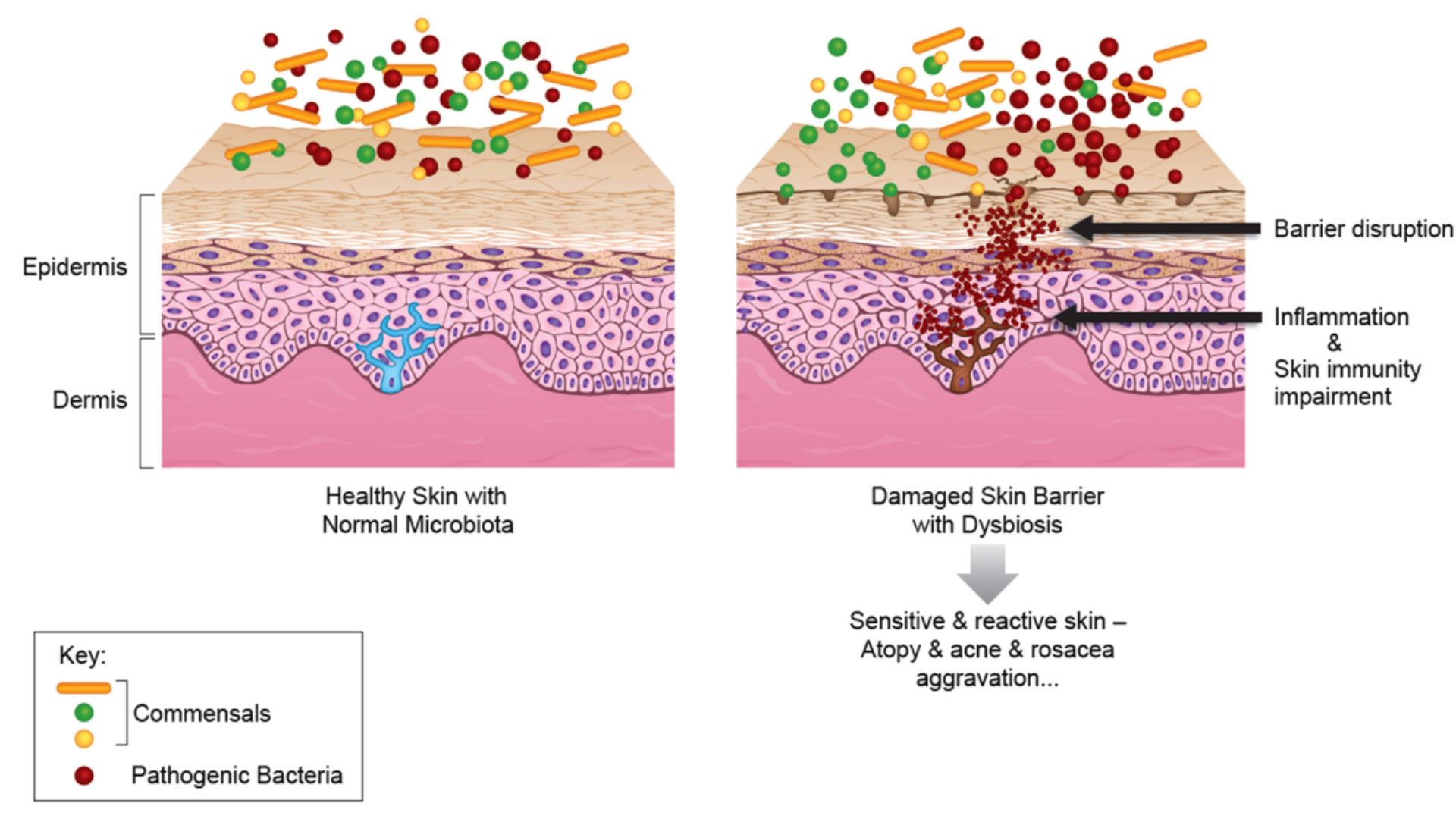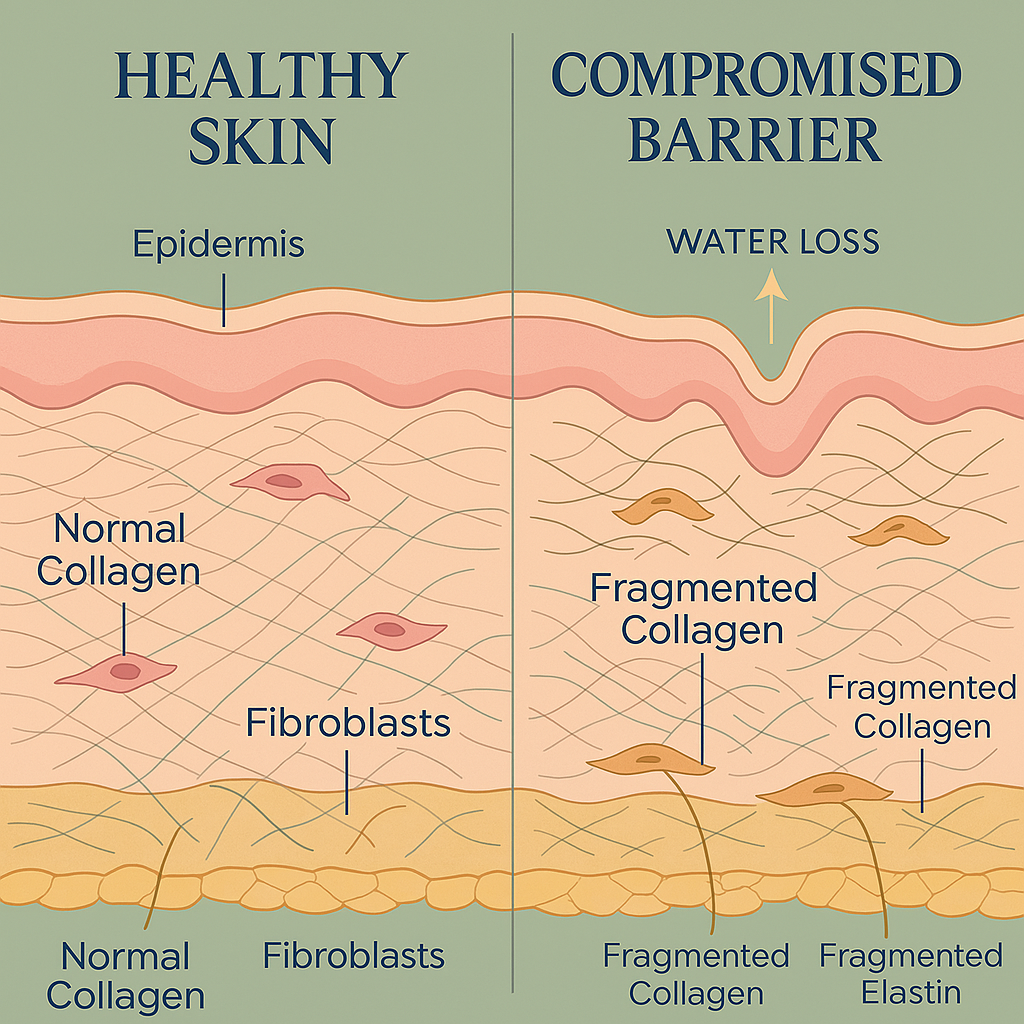
Gut Feelings: Exploring the Gut-Brain Axis and Its Impact on Mental Health
The Gut-Brain Axis Explained The gut-brain axis is a

Do you ever feel like you’re doing everything right with your skincare routine, yet still struggle with persistent inflammation, unexpected flare-ups, or a frustrating lack of radiance? If so, you’re not alone. While topical treatments are important, the key to unlocking truly vibrant, healthy skin might lie deeper — within your gut.
Increasingly, science reveals a powerful connection known as the gut–skin axis, highlighting how internal balance is fundamental to external glow. In this article, we explore the fascinating science behind this connection, from dysbiosis and increase intestinal pemability to the microbiome’s role in skin radiance.
Understanding how your gut bacteria influence skin health is essential for anyone seeking real, long-term solutions to skin irritation, breakouts, or dullness. Let’s dive into the evidence…

So, what exactly is the gut-skin axis?
Think of it as a constant, bi-directional conversation happening between your digestive system and your skin. Your gut is home to trillions of microorganisms – bacteria, fungi, viruses – collectively called the gut microbiome.
This complex ecosystem plays a vital role not just in digestion, but also in regulating your immune system, producing essential nutrients, and managing inflammation throughout your body. [The Role of Probiotics in Skin Health and Related Gut-Skin Axis]
Maintaining a diverse and balanced gut microbiome is the essence of good gut health. When this internal environment is thriving, it sends signals that help keep your skin healthy.
Conversely, disruptions in the gut can send out signals that manifest as skin problems. The relationship between gut bacteria and skin health is intricate, involving complex pathways via the immune system, metabolism, and even the nervous system.
When the delicate balance of your gut microbiome is disrupted – a state called gut dysbiosis – it can trigger a cascade of events affecting your skin. Factors like a diet low in fibre and high in processed foods, chronic stress, or overuse of antibiotics can contribute to dysbiosis. [The Role of Probiotics in Skin Health and Related Gut Skin Axis] This imbalance can sometimes lead to increased intestinal permeability, often referred to as “leaky gut.” In this condition, the gut lining becomes less effective at keeping harmful substances contained, allowing toxins or partially digested food particles to enter the bloodstream.
This breach triggers an immune response, leading to low-grade systemic inflammation throughout the body. Your skin, being the body’s largest organ, often visibly reflects this internal turmoil. This underlying inflammation is a key driver behind many common skin concerns.
Increased inflammation can worsen acne severity and frequency. Some research suggests individuals with acne may have altered gut microbiome compositions, potentially involving bacteria like Firmicutes and Bacteroidetes. [The Gut Pathogens]
Conditions like eczema (including Atopic Dermatitis) are strongly linked to inflammation and immune dysregulation, which can be exacerbated by gut dysbiosis and leaky gut. [The Gut Pathogens]
Chronic, low-grade inflammation (sometimes called “inflammaging”) driven by factors including gut dysbiosis, can accelerate the skin’s aging process. This can manifest as dullness, loss of elasticity, and fine lines, partly due to increased breakdown of structural proteins like collagen by enzymes such as MMP-1. [The Role of Probiotics in Skin Health and Related Gut-Skin Axis]

While dysbiosis highlights the problems, a balanced gut offers profound benefits for your skin’s health, barrier function, and overall radiance. Here’s how gut health and skin vitality are positively linked.
Strengthened Skin Barrier: A healthy gut microbiome helps regulate your immune system and keep inflammation in check. This internal calm supports the integrity of your skin barrier – your first line of defence against environmental aggressors like pollution and microbes. A strong barrier is better at retaining moisture and resisting irritation, contributing to smoother, more resilient skin. [The Role of Probiotics in Skin Health and Related Gut- Skin Axis]
Enhanced Nutrient Absorption: Your gut is where essential nutrients for skin health are absorbed. Vitamins A, C, and E, omega fatty acids, and antioxidants are crucial for skin repair, protection against oxidative stress, and maintaining elasticity. A well-functioning gut ensures your body – and therefore your skin – receives these vital building blocks for radiance. [Gut Microbiota Ecology]
A thriving gut supports nutrient absorption (e.g., vitamin C, omega-3s) that promote skin repair and collagen.
Healthy gut bacteria produce beneficial compounds like Short Chain Fatty Acids (SCFAs). SCFAs —especially butyrate have anti-inflammatory properties and help maintain gut lining integrity, indirectly supporting skin health and calmness.
Disruption in this balance raises zonulin, a protein linked to increased gut permeability and systemic inflammation—both of which are tied to skin conditions like eczema or acne. [The Role of Probiotics in Skin Health and Related Gut-Skin Axis]
By helping control inflammation (which can accelerate collagen breakdown) and ensuring optimal absorption of nutrients vital for collagen synthesis (like Vitamin C), maintaining gut health plays a crucial role in preserving your skin’s structural integrity. While not a direct “collagen booster” in itself, a healthy gut environment supports your body’s natural collagen processes from within, contributing to firmer, more youthful-looking skin.
Inflammation caused by gut dysbiosis can worsen acne, eczema, and signs of ageing.

Understanding the gut-skin axis naturally leads to the question: how can we actively support our gut microbiome for better skin? Probiotics and prebiotics are key players in this internal balancing act.
Probiotics are live microorganisms – often called “friendly bacteria” – that, when consumed in adequate amounts, can provide health benefits. They work by helping to restore balance to your gut microbiome, potentially competing with less desirable microbes, supporting the gut lining, and modulating immune responses.
The world of probiotics is vast, with different strains offering potentially different effects. One example studied in relation to gut health is the beneficial bacteria Lactobacillus casei. Research continues to explore potential Lactobacillus casei benefits, including its role in modulating the gut environment and potentially influencing inflammatory responses that could impact skin conditions. [The Role of Lactobacillus casei on Microbiota ].
It serves as a good illustration of how specific strains within the microbiome can interact with our broader health, including our skin. Remember, it’s just one type among many beneficial microbes, including various species of Lactobacillus and Bifidobacterium, that contribute to a healthy gut ecosystem.
Probiotic strains like *Lactobacillus casei* help balance the microbiome and calm skin.
Often less discussed but equally important are prebiotics. These are typically non-digestible fibers that act as food for your beneficial gut bacteria, including strains like L. casei. By nourishing these “good guys,” prebiotics help them thrive and multiply, further supporting a balanced and resilient microbiome. You can find prebiotics in foods like garlic, onions, leeks, bananas, asparagus, and whole grains.
A deeper exploration of specific probiotic strains, prebiotics, and their detailed roles in skin health is beyond the scope of this article but will be covered in future Timeless Radiance insights!)
Prebiotics (fibres from foods like garlic and leeks) feed beneficial bacteria and support barrier health.

🧬 Curious how to support your gut for radiant skin?
Our upcoming Gut Barrier Formula is designed with this in mind — blending scientifically backed probiotics, prebiotics, and anti-inflammatory support.
Join the waitlist to get 25% off and early access.
Nurturing your gut-skin axis isn’t just about what you eat; your lifestyle plays a significant role too. Here are few habits that can significantly boost your overall skin health and radiance.
Chronic stress can wreak havoc on your gut microbiome, potentially leading to dysbiosis and triggering inflammatory skin conditions like acne and eczema. [Acne vulgaris, probiotics and the gut-brain-skin axis - back to the future?] Incorporating stress-reduction techniques like mindfulness meditation (apps like Plum Village can be helpful), yoga, deep breathing exercises, or simply spending time in nature can make a real difference to both your inner calm and your outer glow.
Moving your body is good for your gut! Regular, moderate exercise has been shown to promote greater diversity in gut bacteria and may help reduce overall inflammation. Find an activity you enjoy and aim for consistency.
Staying well-hydrated is fundamental. Water aids digestion, helps flush toxins, and supports the mucosal lining of the gut. It’s also essential for maintaining skin hydration and plumpness from the inside out.

Your Gut Talks to Your Skin
A healthy gut microbiome regulates inflammation and immunity — major factors in common skin conditions like acne, eczema, and dullness.
Dysbiosis = Inflammation
Poor diet, stress, or antibiotics can cause gut imbalance (‘dysbiosis’), leading to systemic inflammation that shows up on your skin.
Probiotics + Prebiotics = Radiance
Specific strains like Lactobacillus casei and prebiotics from foods like garlic or bananas nourish your gut and help reduce skin flare-ups.
Inside-Out Support > Topicals Alone
Lasting skin glow isn’t just about serums — it’s built from within. Gut diversity boosts collagen resilience, hydration, and barrier strength.
Viewing your gut health not just as essential for digestion, but as a cornerstone of your skincare approach, empowers you to cultivate radiance that truly shines from within.
Want more? Sign up for our newsletter to get exclusive gut-skin guides and early product access
This varies greatly depending on the individual, the specific skin concerns, and the consistency of dietary and lifestyle changes. Some people notice improvements within a few weeks, while for others it might take several months of sustained effort. Patience and consistency are key.
Fermented foods like yogurt, kefir, kimchi, and sauerkraut are excellent natural sources of probiotics and can be very beneficial. Whether a supplement is needed depends on your individual diet, health status, and goals. Starting with incorporating diverse fermented foods is a great approach. If considering supplements, look for high-quality products with clinically researched strains. Most probiotics do not survive digestion, so doing your research is key.
There isn't one single magic bullet, as a holistic approach works best. However, consistently reducing intake of highly processed foods and sugars while increasing fibre-rich whole foods (which feed beneficial bacteria) and effectively managing chronic stress are often two of the most impactful areas to focus on for improving both gut health and skin appearance.
While some topical products containing probiotic extracts or ferments show promise for supporting the skin surface microbiome, their efficacy can vary, and research is ongoing. Addressing gut health internally tackles a root cause of inflammation that topicals alone cannot reach. A holistic approach, combining internal gut support with appropriate skincare, is often most effective.
Guan, L. L., de Bruijn, W. J., Choong, Y. S., & Solis, G. (2019). Fermented Rice Bran and Rice Bran Oil in Traditional Japanese Medicine: Sake as a Potential Functional Beverage. Journal of Ethnopharmacology, 235, 405-418. https://doi.org/10.1016/j.jep.2019.01.007
Lee, D. E., Huh, C. S., & Huh, J. W. (2019). Korean Traditional Use of Fermented Rice Water: A Historical Review and its Modern Applications in Cosmetics. Journal of Cosmetic Science, 70(3), 241-250.
Zhou, J., & Qu, F. (2015). Face Mapping: Chinese Holistic Skin Analysis as an Indicator of Internal Organ Imbalance. International Journal of Dermatology, 54(8), 884-892. https://doi.org/10.1111/ijd.12736
Bowe, W. P., & Logan, A. C. (2011). Acne vulgaris, probiotics and the gut-brain-skin axis – Back to the future? Gut Pathogens, 3(1), 1. https://doi.org/10.1186/1757-4749-3-1
https://www.ncbi.nlm.nih.gov/pmc/articles/PMC10385652
https://www.mdpi.com/1422-0067/24/24/17618
https://journals.plos.org/plosone/article?id=10.1371/journal.pone.0237207

Let us know what you’d like to see on our blog. We’re always open to ideas and would love to hear from you!

The Gut-Brain Axis Explained The gut-brain axis is a

The Science Behind Collagen for Healthy Skin If you’re

What is “Collagen Banking”? Proactive Strategies for Long-Term Skin
Subscribe for Exclusive Insights